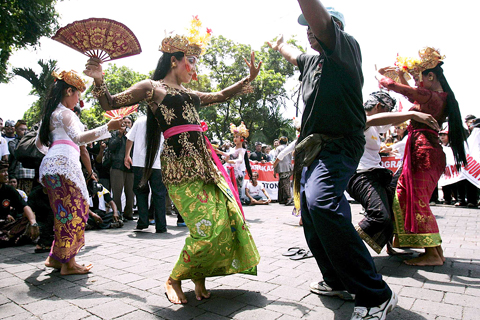Hundreds of people rallied yesterday in the Hindu-majority holiday island of Bali against a tough anti-pornography law branded by critics as a threat to religious freedom.
About 400 people marched through the capital Denpasar against the law, passed by mainly Muslim lawmakers in Jakarta last month.
Protesters denounced as too broad the law’s definition of pornography, saying it was a threat to Indonesia’s diverse non-Muslim minorities and could shatter national unity.

PHOTO: EPA
High-spirited protesters in traditional sarongs and translucent temple blouses marched toward the provincial governor’s office, cheering wildly at traditional dances and performances by local pop singers in curve-hugging pants. The chair of the West Papua provincial parliament, Jimmy Demianus Ijie, said the law criminalizes Papuan culture, where many people are semi-naked.
“I’ve taken part in many Papuan performances in many places and I’ve only worn traditional clothes, but you could see my arse and I was swaying my hips, I was being sexy. Are they going to arrest me for that too?” he told reporters.
A challenge to the law would be launched in Indonesia’s Constitutional Court next week, activist Ngurah Harta told the protest.
“We have to win this judicial review or we will hold a massive civil disobedience campaign,” he said.
Bali Governor I Made Mangku Pastika pledged last month that his government would not enforce the pornography bill, but he did not turn up to yesterday’s protest.
Muslims make up roughly 90 percent of Indonesia’s 234 million population, which also contains sizable Christian, Hindu, Buddhist and Confucian minorities.

Nauru has started selling passports to fund climate action, but is so far struggling to attract new citizens to the low-lying, largely barren island in the Pacific Ocean. Nauru, one of the world’s smallest nations, has a novel plan to fund its fight against climate change by selling so-called “Golden Passports.” Selling for US$105,000 each, Nauru plans to drum up more than US$5 million in the first year of the “climate resilience citizenship” program. Almost six months after the scheme opened in February, Nauru has so far approved just six applications — covering two families and four individuals. Despite the slow start —

MOGAMI-CLASS FRIGATES: The deal is a ‘big step toward elevating national security cooperation with Australia, which is our special strategic partner,’ a Japanese official said Australia is to upgrade its navy with 11 Mogami-class frigates built by Japan’s Mitsubishi Heavy Industries, Australian Minister for Defence Richard Marles said yesterday. Billed as Japan’s biggest defense export deal since World War II, Australia is to pay US$6 billion over the next 10 years to acquire the fleet of stealth frigates. Australia is in the midst of a major military restructure, bolstering its navy with long-range firepower in an effort to deter China. It is striving to expand its fleet of major warships from 11 to 26 over the next decade. “This is clearly the biggest defense-industry agreement that has ever

DEADLY TASTE TEST: Erin Patterson tried to kill her estranged husband three times, police said in one of the major claims not heard during her initial trial Australia’s recently convicted mushroom murderer also tried to poison her husband with bolognese pasta and chicken korma curry, according to testimony aired yesterday after a suppression order lapsed. Home cook Erin Patterson was found guilty last month of murdering her husband’s parents and elderly aunt in 2023, lacing their beef Wellington lunch with lethal death cap mushrooms. A series of potentially damning allegations about Patterson’s behavior in the lead-up to the meal were withheld from the jury to give the mother-of-two a fair trial. Supreme Court Justice Christopher Beale yesterday rejected an application to keep these allegations secret. Patterson tried to kill her

MILITARY’S MAN: Myint Swe was diagnosed with neurological disorders and peripheral neuropathy disease, and had authorized another to perform his duties Myint Swe, who became Myanmar’s acting president under controversial circumstances after the military seized power from the elected government of Aung San Suu Kyi more than four years ago, died yesterday, the military said. He was 74. He died at a military hospital in the capital, Naypyidaw, in the morning, Myanmar’s military information office said in a statement. Myint Swe’s death came more than a year after he stopped carrying out his presidential duties after he was publicly reported to be ailing. His funeral is to be held at the state level, but the date had not been disclosed, a separate statement from the